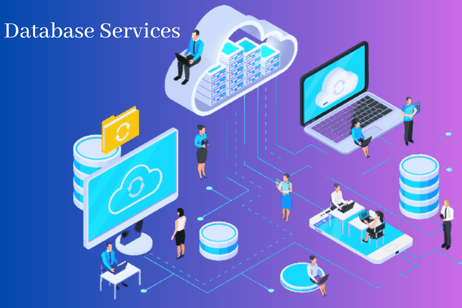Why You Should Use A Database Service Provider
Your business cannot exist without data and information, and neither can the competition that you are trying to beat. This means that every company needs to protect its data as best as possible with the right database management services in place or risk losing out to its competition in what has become a data-driven business world. These are some of the reasons why you should be outsourcing your database management and not taking it upon yourself to do it in-house.

Features Of Database Services
Automated Backup and Recovery
The automated backup and recovery feature of a database service automates the process of regularly creating backup copies of your data. In the event of data loss, system failures, or disasters, these backups can be easily restored to ensure data integrity and minimize downtime, making it a crucial component of data management and disaster recovery strategies. This feature simplifies the backup process, reduces the risk of data loss, and enhances overall data resilience.
High Availability
A database service's high availability feature assures that the database remains accessible and operational even in the event of hardware failures, system crashes, or other disturbances. This is accomplished through the use of redundant infrastructure, failover methods, and automatic recovery processes. This functionality reduces downtime, improves data accessibility, and is essential for applications that require continuous data access for mission-critical operations.
Scalability
A database service's scalability enables for dynamic modifications in resource allocation to accommodate shifting workloads. It supports both vertical scalability (increasing or decreasing individual resource parameters like as CPU and memory) and horizontal scaling (adding or removing database instances). This adaptability guarantees that the database can handle shifting levels of demand efficiently, making it an important component for enterprises with changing data requirements.
Security
The security feature of a database service encompasses a range of measures to safeguard data. It includes robust authentication, authorization, and encryption protocols to control access and protect data from unauthorized users. Additionally, auditing and monitoring tools are employed to track activities and identify potential security threats, ensuring comprehensive data security and compliance with industry standards.
Managed Maintenance
The managed maintenance feature of a database service simplifies the task of keeping the database system up to date and optimized. It includes automated software updates, patch management, and routine performance tuning. By handling these tasks, the service provider ensures that the database operates efficiently, reducing the administrative burden on users and ensuring that the system remains secure and performant.
Monitoring and Alerts
The monitoring and alerts feature in a database service provides real-time insights into database performance and health. It includes tools that continuously track key performance metrics, such as resource utilization, query execution times, and system availability. When anomalies or issues are detected, automated alerts are triggered, allowing administrators to respond promptly, optimize performance, and maintain data integrity.
Data Analytics
The data analytics feature of a database service enables businesses to extract meaningful insights from their stored data. It includes tools for data analysis, reporting, and visualization, allowing users to uncover trends, patterns, and valuable information. This feature empowers data-driven decision-making and enhances the overall utility of the database for strategic planning and optimization.
Cross-Platform Compatibility
Cross-platform compatibility in a database service means that the service can seamlessly work with various operating systems, programming languages, and development frameworks. This feature ensures flexibility and interoperability, enabling businesses to develop applications and services on different platforms while utilizing the same database service. It simplifies application development, promotes versatility, and supports a wide range of technology stacks.
Global Reach
The global reach feature of a database service involves the availability of data centers and infrastructure in multiple geographic regions worldwide. This feature enables businesses to store and access their data from data centers that are geographically closer to their users, reducing latency and improving data access speed. It enhances the user experience for global applications and ensures data redundancy for increased resilience and compliance with regional data sovereignty regulations.
FAQ – Frequently Asked Questions
A database service is a managed service that provides access to a database system, allowing users to store, retrieve, and manage data efficiently.
Database services offer benefits such as scalability, high availability, automated backups, security features, and reduced operational overhead.
Commonly offered database types include relational databases (SQL databases), NoSQL databases, in-memory databases, and columnar databases.
Choosing the right database service depends on factors like data structure, scalability needs, budget, and specific project requirements.
Database services typically offer authentication, encryption, access control, and auditing features to protect data from unauthorized access and breaches.
Data safety and ownership depend on the service provider and the terms of the service agreement. It’s essential to review the provider’s data security policies and terms of service.
Yes, many database services offer separate environments or instances for development, testing, and production to ensure data integrity and security.
Managed database services often handle routine database administration tasks, reducing the need for dedicated DBAs. However, DBAs may still be responsible for optimizing queries, performance tuning, and strategic database decisions.
Shared instances are resources shared among multiple users, while dedicated instances provide isolated resources for exclusive use. Dedicated instances are typically used for higher performance and resource predictability.
Managed database services handle version upgrades and patches automatically to ensure that your database is running the latest stable and secure version.